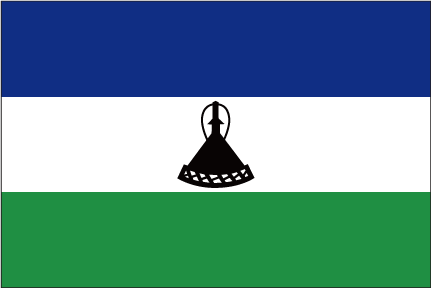Login form
Customs of Lesotho
 Marriage and Family
Marriage and Family
While nuclear families live alone in cities like
Family members are expected to help one another. All those living in a motse contribute to the family’s welfare by doing chores, cooking, minding the cattle, raising chickens, working for a wage and sharing part of it. If one member of an extended family (even if outside the motse) falls on hard times, others in the family are expected to help if possible, although they are not expected to sacrifice their own needs. When a man dies, his possessions are divided among his brothers and sons, who are expected to provide for the man’s wife and any other women who were in his care. The family is a considerable source of pride, and the ability to father or bear a child is an important demonstration of one’s potential. The more children one has, the more respect one is given.
Eating
The normal diet of the Basotho consists of phoofo ea poone or mealie meal (maize meal), rice, potatoes, vegetables, and fruits. Nama ea khomo (beef), nama ea khoho (chicken), and nama ea kolobe (pork) are popular meats. Cold cereals are becoming popular for breakfast, which is often eaten around 10 am. The main meal is in the middle of the day and traditionally consists of moroho (cooked greens), nama (meat), and papa (maize mush). The evening meal is served around 7 pm and contains the same types of foods as were eaten at lunch.
In the capital,
Socializing
Greeting customs vary, but in general Basotho shake hands and say either Lumela (“We believe the same”) or Khotso (“Peace be with you”), followed by U phela joang? (“How are you?”). If acquainted, people make polite inquiries about each other’s family. A more formal greeting, Le phela joang? is used to inquire about the well-being of a group or family. Typically a person asks where the other has been (O tsoa kae?) and where he or she is going (O ea kae?), and an explanation is expected. The greeting process can take several minutes before evolving into conversation, and people may hold the handshake for some considerable time. When two people are passing on the street, or do not expect to engage in conversation, only the two basic greetings are used. There is also a formality to farewells. When leaving, it is customary to say Sala hantle (“Stay well”), while the person staying responds with Tsamaea hantle (“Go well”). Titles are used to address others in very formal situations; otherwise, first names are used.
The Basotho enjoy having guests. Most rural visiting is done without prior arrangement because telephone and mail services are limited. Upon arriving, a visitor knocks on the door and says Koko? (“Are you there?”). The hosts, recognizing the voice, respond with Kena (“Come in”). Even if the door is open, it is extremely discourteous to enter without announcing one’s presence. When visitors arrive, even if unexpected, the hosts will often invite them to stay for something to eat and, if they are far from home, offer them shelter for the night.
Socializing among the Basotho takes place in the home, at public gathering places such as the market, or as part of a pitso (town meeting). A pitso is usually called by the local chief to share important news or to discuss something. If the news is good, an impromptu party may occur.
Recreation
Soccer is the most important sport in
Holidays and Celebrations
Official holidays in
Source: Encarta Interactive World Atlas

